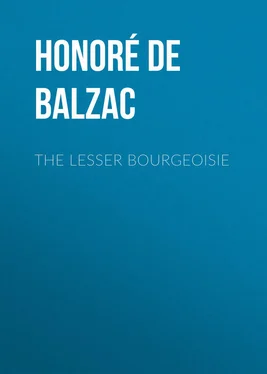Honoré Balzac - The Lesser Bourgeoisie
Здесь есть возможность читать онлайн «Honoré Balzac - The Lesser Bourgeoisie» — ознакомительный отрывок электронной книги совершенно бесплатно, а после прочтения отрывка купить полную версию. В некоторых случаях можно слушать аудио, скачать через торрент в формате fb2 и присутствует краткое содержание. Жанр: literature_19, foreign_antique, foreign_prose, на английском языке. Описание произведения, (предисловие) а так же отзывы посетителей доступны на портале библиотеки ЛибКат.
- Название:The Lesser Bourgeoisie
- Автор:
- Жанр:
- Год:неизвестен
- ISBN:нет данных
- Рейтинг книги:3 / 5. Голосов: 1
-
Избранное:Добавить в избранное
- Отзывы:
-
Ваша оценка:
- 60
- 1
- 2
- 3
- 4
- 5
The Lesser Bourgeoisie: краткое содержание, описание и аннотация
Предлагаем к чтению аннотацию, описание, краткое содержание или предисловие (зависит от того, что написал сам автор книги «The Lesser Bourgeoisie»). Если вы не нашли необходимую информацию о книге — напишите в комментариях, мы постараемся отыскать её.
The Lesser Bourgeoisie — читать онлайн ознакомительный отрывок
Ниже представлен текст книги, разбитый по страницам. Система сохранения места последней прочитанной страницы, позволяет с удобством читать онлайн бесплатно книгу «The Lesser Bourgeoisie», без необходимости каждый раз заново искать на чём Вы остановились. Поставьте закладку, и сможете в любой момент перейти на страницу, на которой закончили чтение.
Интервал:
Закладка:
The oldest usher at the Bank, a man named Lemprun, had an only daughter, called Celeste. Mademoiselle Celeste Lemprun would inherit the fortune of her mother, the only daughter of a rich farmer. This fortune consisted of some acres of land in the environs of Paris, which the old father still worked; besides this, she would have the property of Lemprun himself, a man who had left the firms of Thelusson and of Keller to enter the service of the Bank of France. Lemprun, now the head of that service, enjoyed the respect and consideration of the governors and auditors.
The Bank council, on hearing of the probable marriage of Celeste to an honorable employee at the ministry of finance, promised a wedding present of six thousand francs. This gift, added to twelve thousand given by Pere Lemprun, and twelve thousand more from the maternal grandfather, Sieur Galard, market-gardener at Auteuil, brought up the dowry to thirty thousand francs. Old Galard and Monsieur and Madame Lemprun were delighted with the marriage. Lemprun himself knew Mademoiselle Thuillier, and considered her one of the worthiest and most conscientious women in Paris. Brigitte then, for the first time, allowed her investments on the Grand-Livre to shine forth, assuring Lemprun that she should never marry; consequently, neither he nor his wife, persons devoted to the main chance, would ever allow themselves to find fault with Brigitte. Above all, they were greatly struck by the splendid prospects of the handsome Thuillier, and the marriage took place, as the conventional saying is, to the general satisfaction.
The governor of the Bank and the secretary were the bride’s witnesses; Monsieur de la Billardiere, director of Thuillier’s department, and Monsieur Rabourdin, head of the office, being those of the groom. Six days after the marriage old Lemprun was the victim of a daring robbery which made a great noise in the newspapers of the day, though it was quickly forgotten during the events of 1815. The guilty parties having escaped detection, Lemprun wished to make up the loss; but the Bank agreed to carry the deficit to its profit and loss account; nevertheless, the poor old man actually died of the grief this affair had caused him. He regarded it as an attack upon his aged honor.
Madame Lemprun then resigned all her property to her daughter, Madame Thuillier, and went to live with her father at Auteuil until he died from an accident in 1817. Alarmed at the prospect of having to manage or lease the market-garden and the farm of her father, Madame Lemprun entreated Brigitte, whose honesty and capacity astonished her, to wind up old Galard’s affairs, and to settle the property in such a way that her daughter should take possession of everything, securing to her mother fifteen hundred francs a year and the house at Auteuil. The landed property of the old farmer was sold in lots, and brought in thirty thousand francs. Lemprun’s estate had given as much more, so that Madame Thuillier’s fortune, including her “dot,” amounted in 1818 to ninety thousand francs. Joining the revenue of this property to that of the brother and sister, the Thuillier household had an income, in 1818, amounting to eleven thousand francs, managed by Brigitte alone on her sole responsibility. It is necessary to begin by stating this financial position, not only to prevent objections but to rid the drama of difficulties.
Brigitte began, from the first, by allowing her brother five hundred francs a month, and by sailing the household boat at the rate of five thousand francs a year. She granted to her sister-in-law fifty francs a month, explaining to her carefully that she herself was satisfied with forty. To strengthen her despotism by the power of money, Brigitte laid by the surplus of her own funds. She made, so it was said in business offices, usurious loans by means of her brother, who appeared as a money-lender. If, between the years 1813 and 1830, Brigitte had capitalized sixty thousand francs, that sum can be explained by the rise in the Funds, and there is no need to have recourse to accusations more or less well founded, which have nothing to do with our present history.
From the first days of the marriage, Brigitte subdued the unfortunate Madame Thuillier with a touch of the spur and a jerk of the bit, both of which she made her feel severely. A further display of tyranny was useless; the victim resigned herself at once. Celeste, thoroughly understood by Brigitte, a girl without mind or education, accustomed to a sedentary life and a tranquil atmosphere, was extremely gentle by nature; she was pious in the fullest acceptation of the word; she would willingly have expiated by the hardest punishments the involuntary wrong of giving pain to her neighbor. She was utterly ignorant of life; accustomed to be waited on by her mother, who did the whole service of the house, for Celeste was unable to make much exertion, owing to a lymphatic constitution which the least toil wearied. She was truly a daughter of the people of Paris, where children, seldom handsome, and of no vigor, the product of poverty and toil, of homes without fresh air, without freedom of action, without any of the conveniences of life, meet us at every turn.
At the time of the marriage, Celeste was seen to be a little woman, fair and faded almost to sickliness, fat, slow, and silly in the countenance. Her forehead, much too large and too prominent, suggested water on the brain, and beneath that waxen cupola her face, noticeably too small and ending in a point like the nose of a mouse, made some people fear she would become, sooner or later, imbecile. Her eyes, which were light blue, and her lips, always fixed in a smile, did not contradict that idea. On the solemn occasion of her marriage she had the manner, air, and attitude of a person condemned to death, whose only desire is that it might all be over speedily.
“She is rather round,” said Colleville to Thuillier.
Brigitte was just the knife to cut into such a nature, to which her own formed the strongest contrast. Mademoiselle Thuillier was remarkable for her regular and correct beauty, but a beauty injured by toil which, from her very childhood, had bent her down to painful, thankless tasks, and by the secret privations she imposed upon herself in order to amass her little property. Her complexion, early discolored, had something the tint of steel. Her brown eyes were framed in brown; on the upper lip was a brown floss like a sort of smoke. Her lips were thin, and her imperious forehead was surmounted by hair once black, now turning to chinchilla. She held herself as straight as the fairest beauty; but all things else about her showed the hardiness of her life, the deadening of her natural fire, the cost of what she was!
To Brigitte, Celeste was simply a fortune to lay hold of, a future mother to rule, one more subject in her empire. She soon reproached her for being weak , a constant word in her vocabulary, and the jealous old maid, who would strongly have resented any signs of activity in her sister-in-law, now took a savage pleasure in prodding the languid inertness of the feeble creature. Celeste, ashamed to see her sister-in-law displaying such energy in household work, endeavored to help her, and fell ill in consequence. Instantly, Brigitte was devoted to her, nursed her like a beloved sister, and would say, in presence of Thuillier: “You haven’t any strength, my child; you must never do anything again.” She showed up Celeste’s incapacity by that display of sympathy with which strength, seeming to pity weakness, finds means to boast of its own powers.
But, as all despotic natures liking to exercise their strength are full of tenderness for physical sufferings, Brigitte took such real care of her sister-in-law as to satisfy Celeste’s mother when she came to see her daughter. After Madame Thuillier recovered, however, she called her, in Celeste’s hearing, “a helpless creature, good for nothing!” which sent the poor thing crying to her room. When Thuillier found her there, drying her eyes, he excused her sister, saying: —
Читать дальшеИнтервал:
Закладка:
Похожие книги на «The Lesser Bourgeoisie»
Представляем Вашему вниманию похожие книги на «The Lesser Bourgeoisie» списком для выбора. Мы отобрали схожую по названию и смыслу литературу в надежде предоставить читателям больше вариантов отыскать новые, интересные, ещё непрочитанные произведения.
Обсуждение, отзывы о книге «The Lesser Bourgeoisie» и просто собственные мнения читателей. Оставьте ваши комментарии, напишите, что Вы думаете о произведении, его смысле или главных героях. Укажите что конкретно понравилось, а что нет, и почему Вы так считаете.












